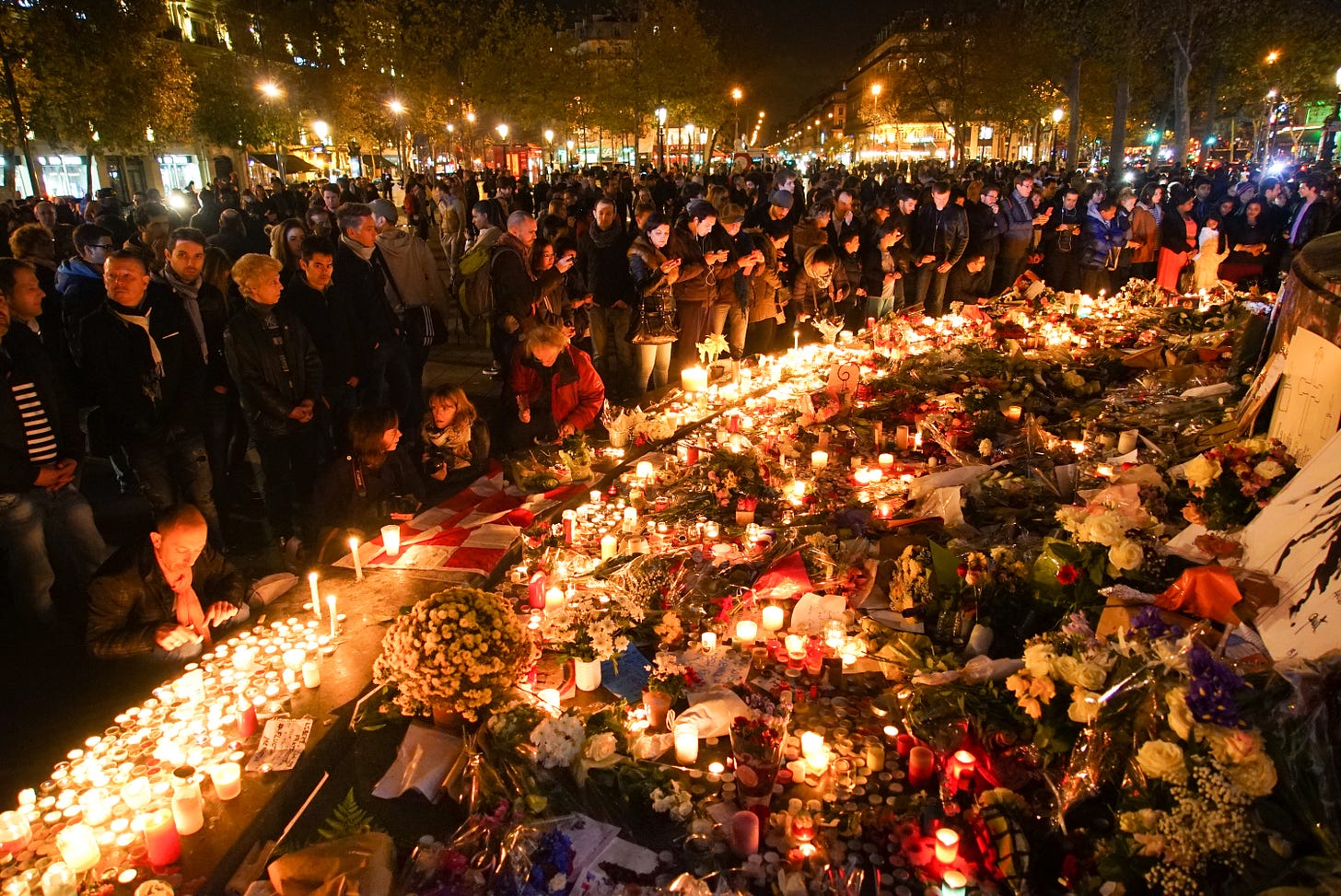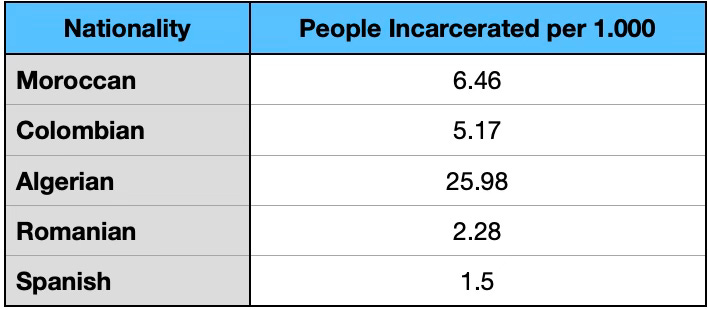Europe at a Crossroads: Immigration, Crime and Integration
Going beyond the headlines on the European debate around immigration, crime and other things.
The refugee crisis that has affected Europe for over a decade, led to a considerable increase in popularity of anti-immigration political parties. For example, The National Rally in France, the AFD in Germany, Party for Freedom in the Netherlands, and Vox in Spain. We have witnessed first-hand the rise in popularity of Vox, which took strong positions against North-African and Middle-Eastern immigration, and to a much lesser extent, Latin American immigrants.
European discourses about immigration tend to focus on cultural aspects, such as the difficulties that Muslim-originated migrants face in the process of integrating in Western societies. Much of these parties use hyperbolic language to demonize immigrants. However, there are admittedly some areas where certain Western values may clash with some interpretations of Islam. We do not claim that these clashes are significant issues for the majority of immigrants, but that they could be an issue for a subset of them. There are legal and illegal immigrants from all nationalities, social classes, and cultural backgrounds. They have a diverse set of motives for immigrating.

The problems with immigration in Europe
Some potential cultural clashes include the role of religion in society, freedom of expression, the presumption of innocence, the rule of law, and more recently women and LGBTQ rights. For many immigrants these are beneficial and appealing. Nevertheless, a smaller subset engages in certain cultural practices that are incompatible with these values. In the UK an Anti-immigration think tank published a study arguing that foreigners are more than three times as likely as British nationals to be arrested for sex crimes. For example, the United Kingdom’s Government estimated that over 100,000 women in the UK have undergone female genital mutilation, and that thousands are at risk. The Times, a UK Newspaper, claimed that each year there are about 500 victims to this practice. We think one victim is one too many and efforts should be made to eradicate this practice. This is one problem among many that societies need to address.
No religion explicitly calls for female genital mutilation, yet this practice is used in a few Islamic and Christian groups. The mutilation is carried out between infancy and around the time girls turn fifteen. There are close to six million girls in Britain within that age range, making 500 girls 0.0083% of the population in that age range. Recent studies suggest that most FGM victims were mutilated before arriving to the UK. We condemn FGM and find that it is incompatible with Western values. We are abhorred by this practice and think most immigrants would not even consider it. We do not mean to diminish the trauma and suffering of FGM victims and also want to highlight other problems that UK children face: over 40% of children between five and 9 are expected to be obese by 2050; a steep rise in the number of teens needing acute hospitalization for mental health reaching 39,000 cases in 2022, accidental poisoning, and more.
The German Federal Police, the Bundeskriminalamt, linked mass migration to an increase in violent crime in November 2023. The police reported an increase of around 17% compared to the first half of 2022. The police also attributed the spike to the cost of living crisis, and increased mobility post lockdown. Their report explicitly linked migrant crime to other socioeconomic factors. They concluded that, while the percentage of non-German violent crime suspects increased, it was proportional to the rise of non-German population. Different political parties have interpreted this very differently. The IFO Institute studied crime rates between 2018 and 2023 and found that an increase in the number of immigrants does not affect local crime rates. Nevertheless, the results of this study have been criticised by other writers due to inconsistent data parameters and controlling factors that could explain crime such as unemployment, country of origin and nationalised Germans.
Furthermore, a Swedish study based on surveys, found that there was an increase in the percentage of Swedes who experienced crime. It found an increase in the percentage of Swedes who experienced crime from 19.5% in 2021 to 20.1% in 2023. In contrast, property crimes declined. About a quarter of survey respondents said they feel unsafe outdoors at night. A little over half of respondents said they trust the police force.
The Threat of Terrorism

The most shocking and terrifying phenomenon resulting from certain forms of immigration is the number of terrorist attacks in recent years (months even). The European Parliament recorded 120 terrorist attacks in 2023 across seven EU Nations, with 98 completed, 13 foiled and 9 failed. This is a considerable increase from previous years, with just 28 in 2022.
Surprisingly, by far the most completed attacks were not carried out by immigrants or jihadist groups. Rather, 70 out of the 120 attacks were performed by separatist groups, with no casualties or injuries. On October 8-9 of 2023, there were almost thirty attacks in Corsica, and bombs exploded in twenty-two properties. These were carried out by a group seeking Corsica’ independence. Having said that, the deadliest attacks were performed by jihadist groups, causing six deaths and twelve injuries.
It is worth noting that, as of March 2025, two terror attacks in Germany and Austria have been linked to jihadist groups. Interestingly, multiple high-profile attacks have involved radicalized second-generation immigrants. This speaks to a critical failure in the process of integration, which is harboring resentment among the descendants of some immigrant communities. We want to emphasize that the process of integration requires efforts from both the person integrating, and the society to which they arrive.
While the threat of jihadism is latent across the continent, when analyzing the facts, a few things become evident. First, while undoubtedly shocking and horrifying, these events remain a relatively small menace as the number of attacks and subsequent victims are small in comparison to other threats. Second, even though we do not know precisely the methods used to prevent them, it appears that national security’s responses are, in the absence of more attacks, effective. Lastly, and to our surprise, the biggest number of terror attacks, albeit less deadly, come from nationalist and separatist groups and not from immigrants.
We are deeply saddened and disturbed by the senseless killing earlier this week in Mannheim. A forty year old German citizen drove a car through a market killing two and injuring several people. The man is said to have had mental health issues, and a conviction for hate speech, as well as far right posts on social media. Last Christmas a Saudi with far right sympathies drove his car through a market. These killings should have no place in our modern, free, and open societies. Terrorism is a major concern for European countries, which should be dealt with severely and with the appropriate level of seriousness. Everyone, natives and immigrants alike, benefit from living in safer societies.
Even if the risk for terror attacks is low, these attacks, if rare and with low mortality rates, can have deep effects on the everyday lives of everyday people. Thus, in spite of risks being relatively less than one may gather from reading the news, it is still pivotal to reduce the incidence of these attacks so people can live freely.
Are Immigrants Committing More Crimes in Spain?
Criminality and insecurity are, understandably, among the leading concerns for receiving countries. These factors are probably what best explain the rise in popularity of anti-immigration parties. To analyze this discourse, let’s take a look at Spain, where Vox politicians declare illegal immigrants to be the biggest threat to Spanish society. We turned to ChatGTP to collect demographic data in Spain to examine the arguments made by Vox.
We asked ChatGPT to determine the total number of Moroccans, Colombians, Algerians, Romanians in Spain and in Spanish prisons.
(Whenever we use ChatGTP, we will tell you. Please take in mind how these figures were collected when drawing conclusions from the following section.)
To investigate each of these groups further. First, we asked ChatGPT to estimate the frequency of criminals per every 1000 people using the entire population, and the 16 to 70 cohort.
In these cases, immigrant groups are more likely than Spanish citizens to be incarcerated. Nevertheless, the difference in incarceration rates between Romanians and Spaniards is not much. Even in cases where the difference appears large (i.e. Moroccans) we still find that the overwhelming majority of Moroccans are not incarcerated. For example, according to these calculations, out of 1000 adult Moroccan immigrants, only 6 would be convicted criminals. While this is not an insignificant number, and measures should be taken to diminish the incidence of crime in these communities, it is hardly the existential threat Vox and others made them out to be. Perhaps more concerning would be the share of Algerian immigrants in prison. Yet the total number of Algerians is smaller and hence the calculation may be even less reliable.
There are discrepancies in terms of nationality. Data seems to support that some immigrants are prone to commit more crimes of a specific nature. And yet, it is also true that there are more factors that influence how likely these immigrants are to commit crimes, such as socioeconomic background, education, failures in integration and job opportunities, among others.
There can also be differences in the kinds of legal representation people from different places and different languages may be able to procure, i.e. a Spanish-speaking immigrant might be able to access better legal representation than an Arabic-speaking one. Thus, rather than focusing solely on the country of origin, which is not the only predicting variable, causes great harm to thousands of immigrant families and increases tension between communities and nations; solutions should tackle multiple fronts, and require much more complexity than what is advertised by these political parties.
In short, this brief exercise shows that this is a complex issue that warrants a sophisticated analysis. Far more sophisticated than ours. We merely sought to use ChatGPT to explore the magnitude of some of these issues. We should also state that not all criminals are caught, not all crimes result in incarceration and hence these numbers may not fully represent the amount of criminal activity in Spain. Also, ChatGTP collected this data, so take that as you will.
Some Thoughts on Immigration & Crime
We find that current arguments regarding immigrants are rehashing pre-existing anxieties and fears. This extreme view of immigration lacks nuance and complexity and is riddled with harmful assumptions which cause unintended consequences. Migration has played an essential role in the building of our economies, cultures, identities and nations.

Furthermore, other types of crime can have an impact on our everyday lives, and yet, they receive less attention in the public discourse. Corruption in both public and private institutions can affect the lives of many. Minor infractions are committed by wide portions of the population (speeding, jay-walking). Participating in the underground economy is also considered a crime and accounts for about 14% of the economic activity in the EU. One can also consider scams or policies that allow businesses to act in predatory fashion, or legislation that encourages speculating and the creation of economic bubbles.
We also understand that most crimes associated with immigration can cause a more visceral reaction in the public. The feeling of insecurity, vulnerability and powerlessness leaves a deep mark on our psyche.
Conclusion
Immigration presents opportunities and difficulties. Immigrants face a series of challenges that include economic costs, adapting to cultural differences, learning new languages, and more. Both legal and illegal migration can pose challenges to the receiving country. We would call for immigration reform that creates further legal mechanisms to welcome prospective workers into nations.
It is our firm belief that migration has, in most cases, a net positive effect in the receiving country. The flow of humans around the world allows for a fruitful exchange of ideas, skills, goods, services, values, and an overall betterment of society. We are both legal immigrants that found a better life because we migrated. We would like to think we make positive contributions to our communities.
This is not to say that negative outcomes do not result from immigration. There are examples in which poor policies, massive and sudden movements of people, as well as inherent tensions from specific cultural practices and beliefs, lead to worsening conditions, insecurity and conflict.
We believe immigration to be desirable, however, there is no denying that problems arise when dealing with both the receiving and the arriving populations. Crime, marginalization, insecurity and cultural tensions are common issues that result from massive immigration. These are not insurmountable problems and we think intellectual exchange is important. We celebrate syncretism.
In short, we find that certain discourses which are gaining traction and support across Europe could have harmful consequences for all parties involved. It is not a matter of ignoring the issues, rather putting them in their proper context to arrive at effective solutions.






